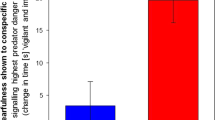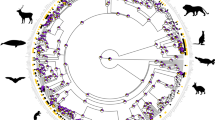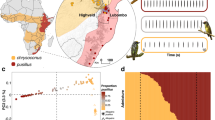Abstract
ALMOST all accounts of the natural history of the grey seal Halichoerus grypus give the impression that a cow invariably seeks and feeds only her own pup among the dozens or hundreds in a breeding colony which may be at an equivalent stage of development as her pup. Normal feeding fidelity may be represented thus 
This is a preview of subscription content, access via your institution
Access options
Subscribe to this journal
Receive 51 print issues and online access
$199.00 per year
only $3.90 per issue
Buy this article
- Purchase on Springer Link
- Instant access to full article PDF
Prices may be subject to local taxes which are calculated during checkout
Similar content being viewed by others
References
Hewer, H. R., and Backhouse, K. M., Proc. Zool. Soc. Lond., 134, 157 (1960).
Coulson, J. C., and Hickling, G., J. Anim. Ecol., 33 (3), 485 (1964).
Davies, J. L., J. Mammal., 38, 297 (1957).
Mansfield, A. W., Fish. Res. Board Can. MS Rep. Ser. Biol., No. 846, 1–17 (1965).
Smith, E. A., J. Zool., 150, 463 (1966).
Wynne-Edwards, V. C., Animal Dispersion in Relation to Social Behaviour (Edinburgh, 1962).
Author information
Authors and Affiliations
Rights and permissions
About this article
Cite this article
SMITH, E. Adoptive Suckling in the Grey Seal. Nature 217, 762–763 (1968). https://doi.org/10.1038/217762a0
Received:
Revised:
Issue Date:
DOI: https://doi.org/10.1038/217762a0
This article is cited by
-
Three cases of potential twinning in Weddell seals (Leptonychotes weddellii) at Fildes Peninsula, King George Island, Antarctica
Polar Biology (2018)
-
Alloparenting in Steller sea lions (Eumetopias jubatus): correlations with misdirected care and other observations
Journal of Ethology (2007)
-
Mother-pup separation and adoption in northern elephant seals
Behavioral Ecology and Sociobiology (1982)
Comments
By submitting a comment you agree to abide by our Terms and Community Guidelines. If you find something abusive or that does not comply with our terms or guidelines please flag it as inappropriate.



